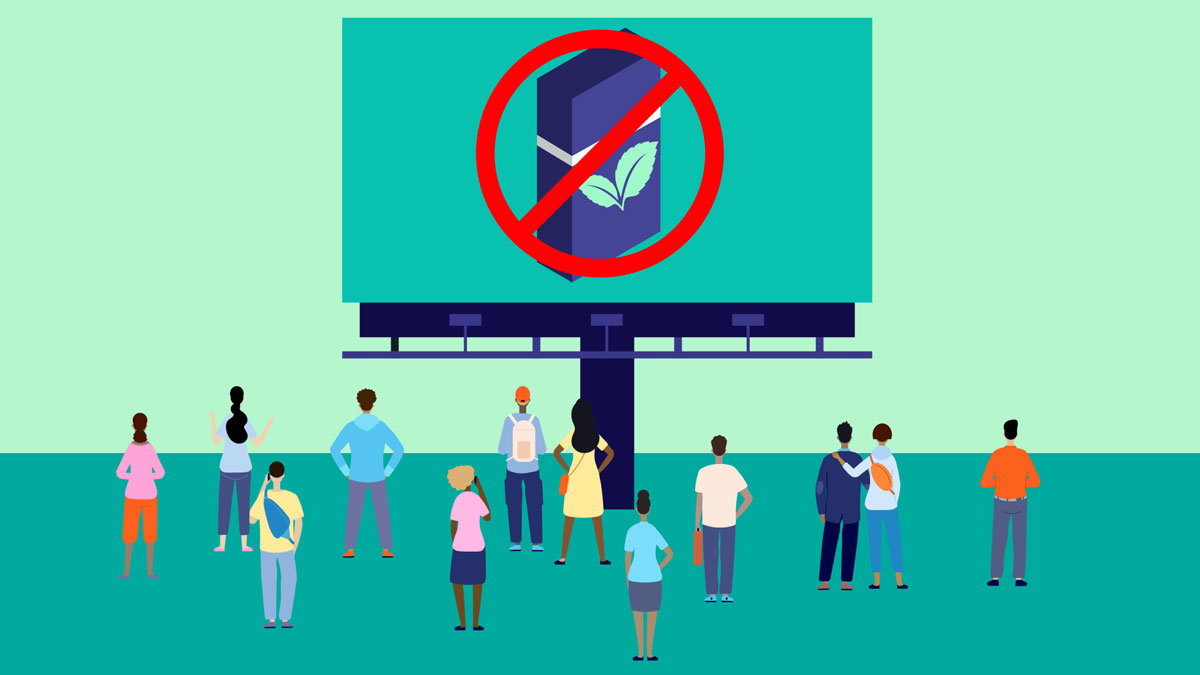At a glance
- Menthol is a chemical compound found naturally in peppermint and other similar plants.
- Tobacco companies add menthol to commercial tobacco products to make them seem less harsh and more appealing to young people and to people who have never used tobacco products.
- Menthol in cigarettes can make it more difficult to quit smoking.

What is menthol?
Menthol is a chemical compound found naturally in peppermint and other similar plants. Menthol can also be produced in a lab.1
Menthol can change the way the brain registers the sensations of taste and pain.2 In cigarettes, menthol creates a cooling sensation in the throat and airways, making the smoke feel less harsh and easier to inhale.3
Menthol is also used in other commercial tobacco products, such as e-cigarettes, cigars, hookah tobacco, smokeless tobacco, nicotine pouches, and heated tobacco products.
According to federal law, tobacco manufacturers cannot market cigarettes with "characterizing flavors," except for menthol or tobacco-flavored cigarettes.4 Almost all cigarettes sold in the United States contain some natural or lab-created menthol. However, there is usually more menthol in cigarettes marketed specifically as "menthol" compared to other cigarettes.5
In 2021, sales of menthol-flavored cigarettes made up 37% of all cigarette sales in the United States. This is the highest proportion since major tobacco companies were first required to report those data to the federal government in 1963, when menthol cigarettes made up 16% of all cigarettes sales in the U.S.6
State Menthol Fact Sheets
What's the bottom line?
Tobacco companies add menthol to commercial tobacco products to make them seem less harsh and more appealing to young people and to people who have never used tobacco products.
Nicotine is the addictive drug in cigarettes and other tobacco products. Menthol enhances the effects of nicotine on the brain and can make tobacco products even more addictive. In recent years, tobacco companies also have increased the amount of nicotine in some menthol cigarettes.
Menthol in cigarettes can make it more difficult to quit smoking. People who smoke menthol cigarettes can be less likely to successfully quit than people who smoke non-menthol cigarettes.
Tobacco companies aggressively market menthol-flavored tobacco products to different groups of people, especially Black people. This marketing contributes to targeted population groups being more likely to smoke menthol cigarettes than other population groups.
Young people, racial and ethnic minority groups, LGBTQ+ people, women, people with a low income, and people with mental health conditions also are more likely to smoke menthol cigarettes than other population groups.
We can help reduce menthol tobacco use and help people quit using tobacco products by:
- Increasing equitable access to evidence-based quitting resources, including counseling and medication.
- Implementing policies that prohibit or decrease sales of menthol tobacco products.
- Kamatou GP, Vermaak I, Viljoen AM, Lawrence BM. Menthol: a simple monoterpene with remarkable biological properties. Phytochemistry. 2013;96:15–25.
- U.S. Dept of Health and Human Services. The Health Consequences of Smoking—50 Years of Progress: A Report of the Surgeon General. U.S. Dept of Health and Human Services; 2014. Accessed November 2, 2023. https://www.ncbi.nlm.nih.gov/books/NBK179276/
- U.S. Food and Drug Administration. Scientific Review of the Effects of Menthol in Cigarettes on Tobacco Addiction: 1980-2021. Center for Tobacco Products; 2022. Accessed November 2, 2023. https://www.fda.gov/media/157642/download
- Tobacco Product Standards. Federal Food, Drug, and Cosmetic Act, 21 U.S.C. § 387g (2010). Accessed November 2, 2023. https://www.govinfo.gov/content/pkg/USCODE-2021-title21/html/USCODE-2021-title21-chap9.htm
- Ai J, Taylor KM, Lisko JG, Tran H, Watson CH, Holman MR. Menthol content in US marketed cigarettes. Nicotine Tob Res. 2016;18(7):1575–1580.
- U.S. Federal Trade Commission. US Federal Trade Commission Cigarette Report for 2021. Federal Trade Commission, 2023. Accessed November 2, 2023. https://www.ftc.gov/system/files/ftc_gov/pdf/p114508cigarettereport2021.pdf
